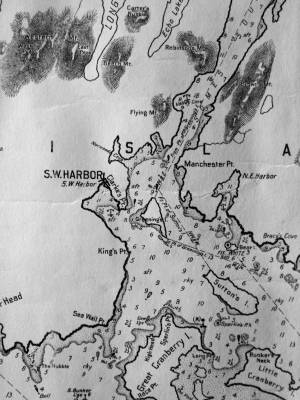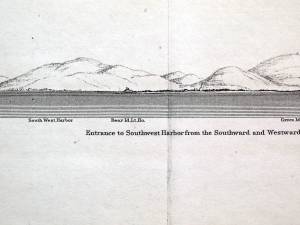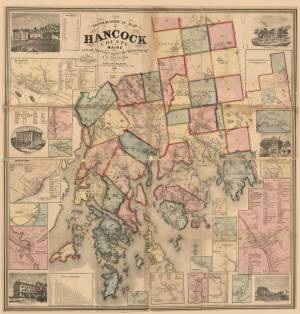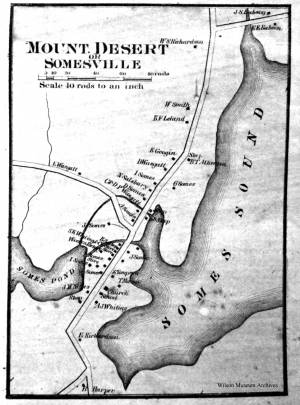An online project under the direction of the CAPE ANN MUSEUM
Mount Desert Island & Rock
View related Fitz Henry Lane catalog entries (22) »
Mount Desert was in the Frenchman's Bay Customs District, and in 1850 the district ranked 4th, at 11.2%, among Maine's 13 customs districts, for its investment in the cod fisheries. The thick, old-growth forest provided ample opportunity for sawmills and the export of pine lumber and timber, as well as shipbuilding, which went hand-in-hand with fishing vessels for the cod fisheries.The coasters of the island found ample freight in the shipment of lumber from the sawmills of the Union River at Ellsworth. The rugged interior of the island limited settlements to the coastal fringe, creating a number of independent, isolated communities. Mount Desert's small fishing and farming communities, in the early 1850s, were set like small diamonds in an incredible crown of natural beauty. These small, isolated villages, clinging to a jagged coastline which stood resolute against the breaking sea, would have reminded artists like Lane of an America untouched by the progress of time. This was New England as it had once been, and there were few places in coastal New England where this claim could still be made.
Mount Desert, as it is colloquially known, has been known by many names throughout its history. The Etchemin called it Pem-etn-ic, "a range of mountains," as seen from the sea, "where the hills rise in a long saw-toothed range," Champlain called the island, notable for its granite mountains, of which one rises 1530 feet , "Isle des Monts Deserts," "barren mountains Island," and Sieur de la Mothe de Cadillac, who was granted a large tract at the head of Frenchman Bay in 1687, called Douaquet. Cadillac is one of a number of Frenchman whose presence in history is denoted by Frenchman's Bay.
At the beginning of recorded history Asticou was an Etchemin Sakom who lived seasonally on Mount Desert with his band. His larger homeland, Ketakamigwa, "the big land on the seacoast," was "an ecologically diverse coastal woodland environment, combining a saltwater archipelago with a 1000 mi.² freshwater hinterland broken by hills, swamps, lakes and ponds, and drained by a few major rivers in numerous smaller streams." The highly mobile Wabenaki families, ethnically identified as Etchemins, inhabited Penobscot Bay, making full use of the abundance of natural resources, including the building of a fish weir, K'chi-siti-mokan'gan, "The Great Fish Weir," between Little and Big Deer Isle, from which Eggemoggin Reach is derived), and shaping the natural environment to suit their needs.
Asticou, or members of his band, were on hand to greet Champlain in 1604, and he was at Manchester Point in 1613 when Father Baird and three Jesuit priests dropped anchor on their way to establish a Catholic mission on the Penobscot River. Asticou invited them to stay, the invitation was accepted, and the mission of St. Sauveur at Fernald Point began to be built. The work had barely begun when the mission was destroyed by Capt. Samuel Argall, an English privateer from Jamestown.
Champlain named Mount Desert but left its sentinel rock, 26 miles off shore, unidentified. The island was given the name of Mount Desert Dry Rock in the 18th century, and shortened somewhat after this. The island served as a navigational aid, not a hazard, for coastal seamen. The US government purchased this pile of rocks from the State of Maine in 1829, there surely must have been a few laughs over this transaction, and the government authorized $5000 to build a light station, which began operation in 1830.
– Mark Honey
References:
Conkling, Philip W, "Islands in Time," A Natural and Cultural History of the Islands of the Gulf of Maine, Island Institute, Rockland, and Downeast Books, Camden.
Eckstorm, Fannie Hardy, "Indian Place-Names of the Penobscot Valley and the Maine Coast," University of Maine Studies, 2nd Series, #55, November 1941, reprinted 1960 by the University of Maine Press. Frank G Speck's "Penobscot Man," University of Pennsylvania Press, 1940.
Duncan, Roger F, "Coastal Maine, A Maritime History," WW Norton & Company, New York, 1992.
Prins, Harald E L, and McBride, Bunny, "Asticou's Island Domain: Wabenaki Peoples at Mount Desert Island," 1500-2000, Acadia National Park, Ethnographic Overview and Assessment, Volume 1, repaired under cooperative agreement with The Abbe Museum, Bar Harbor, Maine, Northeast Regional Ethnography Program, National Park Service, Boston, Massachusetts, September, 2007.
Rowe, William Hutchinson, "The Maritime History of Maine," Harpswell Press, 1996.
Related tables: Mount Desert, Maine – Mount Desert Rock Light » // Northeast Harbor » // Somes Sound » // Southwest Harbor »
Newsprint
Gloucester Daily Telegraph
Article by Joseph L. Stevens
"The beauties of this place [Maine] are well known and appreciated among artists. We heard of Bonfield and Williams who had reluctantly left but a short time before. Fishe had spent several weeks there. Champney and Kensett were then in another part of the island, and we have reason to believe that Church and some others were in the immediate vicinity–Lane who was with us, made good additions to his portfolio."
Newspaper
Gloucester Telegraph p. 2, col. 3
Boston Public Library
Accession # G587
"PICTURES. – Two of Lane's finest paintings are on exhibition at the Marine Insurance Reading Room. One is a most spirited representation of a gale on the sea coast. Huge rollers come rumbling towards the rocky foreground where the spray dashes high and the receding wave is thrown up sharp and wedgelike by the great crested breaker under which it is speedily overwhelmed. In the middle distance a bald headland receives the sun's rays which slant through the mist from an opening in the heavy clouds. A close reefed ship leaps proudly over the waves and safely weathers the dangerous point beyond.
The companion-piece is a bay scene in which the setting sun throws a flood of golden light over the placid water. Vessels of different kinds, with sails in light and shadow, enliven the picture. A homely old sloop getting underweigh well sets off the most prominent object - a handsome ship under full canvass, slowly gliding over the ground-swell with a light breeze afloat, while there is hardly enough below to make a cat's paw.
These pictures were painted for the spring exhibition of the National Academy at New York, whither they will go unless stopped by some appreciative purchaser.
In Lane's studio are several gems of art. - Wind against Tide on Georges, a stirring pure marine, and Recollections of Mount Desert, an exquisite bit of landscape, evince a versatility of pencil which he is not generally known to possess.
The demand for a View of Gloucester worth having (as that poor caricature of Tidd's is not) has induced Lane to supply another, which is the third and largest of his series. It is taken from Rocky Neck, like its predecessor. Of course all the modern improvements visible from that point of view are represented with the artist's usual accuracy of drawing. To the first 300 subscribers the print will be offered at the low price of $2.25 per copy. The original painting from which it is lithographed, and several other of his pictures, will be distributed by lot among those who choose to take their copies at $2.75 – a price which the print alone will command before the entire edition is exhausted."
Chart G
Charles G. Hutchinson, Publisher
Private Collection
George W. Eldridge was a Boston-based publisher of charts, pilot books, and tide tables for yachtsmen cruising in the New York–New England region. Detail of the Mount Desert portion of a much larger chart.
Also filed under: Maps » // Northeast Harbor » // Somes Sound »
Chart
U.S. Coast Survey
Chart with key showing the route of an excursion on the sloop "Superior" out of Castine made by William H. Witherle, Lane, Stevens and friends during which Lane made several sketches of Mt. Desert scenery. The trip was chronicled by Witherle in his diary of 1852.
View related Fitz Henry Lane catalog entries (6) »
Also filed under: "Superior" (Sloop) » // Castine » // Penobscot Bay » // Southwest Harbor » // Witherle, William Howe »
Illustration
"U.S. Coast Pilot, Atlantic Coast, Parts I–II." First edition. Published by Washington GPO, 1891
Folded plate between pp. 62 and 63
Also filed under: Bear Island » // Maps » // Northeast Harbor, Maine – Bear Island Lighthouse » // Southwest Harbor »
Photograph
From The Illustrated Coast Pilot with sailing directions. The Coast of New England from New York to Eastport, Maine including Bays and Harbors, published by N. L. Stebbins, Boston, Mass.
Also filed under: Mount Desert, Maine – Mount Desert Rock Light »
Wilson Museum, Castine, Maine.
Library of Congress Catalog Number 2011588006
1860 map, including census of towns.
Also filed under: Castine » // Maps » // Penobscot Bay »
Personal diary
Wilson Museum, Castine, Maine (A00060-1a-1h)
Description of an excursion taken by Joseph Stevens, Jr., Lane, Witherle, Samuel Adams, Jr., and George Tilden around the islands of Maine near Mt. Desert. The group hired the Sloop "Superior" which was owned by Pilot Getchell. In his diary, Witherle mentions multiple times that "Lane took a sketch" especially when the water was calm. Lane often stayed on board the boat, while the others went ashore.
Excerpts of the diary include:
August 16: "Lane has a knack for frying fish."
August 17: "leaving Lane to take a sketch, we took a climb."
August 19: "went to ascend one of the highest mountains. 3/4 the way up we had to wait – once in a while for Lane who with his crutches could not keep up with us – but got along faster than we thought possible . . .Lane got up about an hour after the rest of us."
The entire text is transcribed in an account published by the Wilson Museum.
View related Fitz Henry Lane catalog entries (6) »
Also filed under: "Superior" (Sloop) » // Adams, Samuel, Jr. » // Biographical information » // Blue Hill » // Castine » // Chronology » // Diaries / Ledgers / Etc. » // Somes Sound » // Stevens, Joseph, Jr. » // Tilden, George » // Witherle, William Howe »






